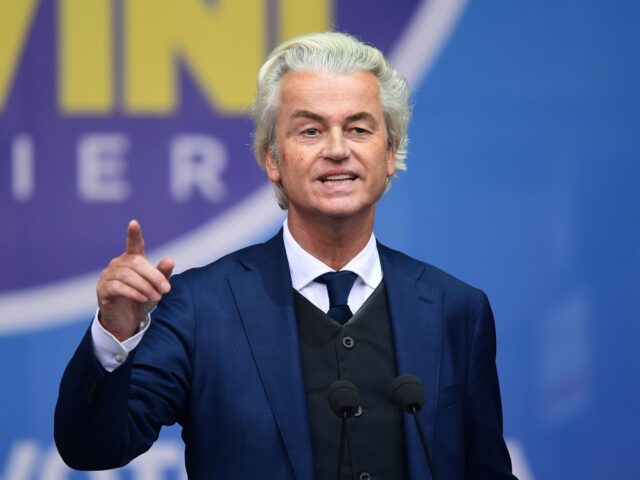Geert Wilders and his Party for Freedom (PVV) have swept to a stunning victory in Dutch elections, with exit polls predicting that his populist anti-mass migration party will become the largest force in the House of Representatives in the Netherlands.
UPDATE 2130: Pieter Omtzigt, whose New Social Contract (NSC) party is projected to secure 20 seats in the House of Representatives, said that he is “available to govern”, suggesting that a potential coalition with election victor Geert Wilders. While Omtzigt did not mention Wilders’ Party for Freedom by name, he referenced comments from the populist, saying he is “willing to jump over his shadow”. Previously, Omtzigt had suggested he would not be willing to work with Wilders and said Wednesday evening that forming a government would not be easy, but it is the first indication that Wilders’ strong success may force centre-right parties to fall in line and support him as prime minister. Wilders, who is projected to have secured 35 seats, will need at least 41 seats from other parties to pass the 76-seat threshold needed for a majority.
UPDATE 2100: In his first response to his impressive election upset, Party for Freedom leader Geert Wilders hailed the success as a “mega victory” while saying that it is now impossible to ignore the Dutch populists. Wilders went on to say that he was determined to govern and called on the other centre-right parties to “step over their own shadows” and come together to form a government. He said that if they refused to do so, it would be “very undemocratic” and that the voters of the Netherlands “would not accept that”.
The original story continues as follows:
A wave of anti-mass migration sentiment across Europe has seen staunch Islam critic Geert Wilders pull a massive upset in the Netherlands, as exit polls from research agency Ipsos predict that his Party for Freedom (PVV) will become the largest party in the House of Representatives with an estimated 35 seats, public broadcaster NOS reports.
Performing in a way that many would have considered unthinkable just a week ago, the populist party is now projected to have more than doubled its representation over the previous election in 2021 when the PVV only managed to secure 17 seats in the House.
The PVV was followed by the leftist-green coalition GL-PvdA of Great Reset proponent Frans Timmermans at 26 seats, the centre-right People’s Party for Freedom and Democracy (VVD) at 23 seats, and the centrist New Social Contract (NSC) at 20.
The exit polls then projected the socially liberal Democrats 66 as having picked up 10 seats, falling from 24 in the previous election and seven seats for the upstart Farmer Citizen Movement (BBB) after previously only holding one seat in the chamber.
Hailing the apparent victory, Geert Wilders shared a video on social media of himself celebrating the results while proclaiming that his party was now the strongest force in the country.
While the victory for Wilders, who has been a longtime critic of the European Union, mass migration, and the “Islamisation” of the Netherlands, represents a stunning overturning of over a decade of globalist rule under Prime Minister Mark Rutte, it remains to be seen if the other right-wing parties in the country will coalesce around Wilders and back him for prime minister.
Pieter Omtzigt, the centre-right leader of the New Social Contract, which secured 20 seats according to the exit polls, has previously said that Wilders’ previous demands to outlaw the Qur’an and ban Islamic mosques from the country would prohibit him from joining forces with the populist firebrand despite Omtzigt largely agreeing with Wilders on mass migration.
Similarly, Dilan Yeşilgöz-Zegerius, the Kurdish-Turkish heritage successor, has also said that she would not serve in a Wilders cabinet if he won the elections even though she has also argued, like Wilders, that ending mass migration is a key priority.
Wilders, who has spent years under police protection after being placed under a fatwa order to kill him over his views on Islam, has said that he would be willing to put his positions on the religion aside in order to form a government and deliver on the pressing issues of the people, such as the housing crisis, healthcare failings, and reducing immigration.
However, the centre-right parties may have no choice but to form a coalition with Wilders if they wish to prevent a potential leftist bloc from taking power or risking another election.
The strong election result for Wilders comes amid a growing movement against the past decade of open borders policies in Europe, with populist parties making significant gains in countries like France and Germany, while right-wing anti-mass migration parties have already taken power in Italy and Sweden.

COMMENTS
Please let us know if you're having issues with commenting.